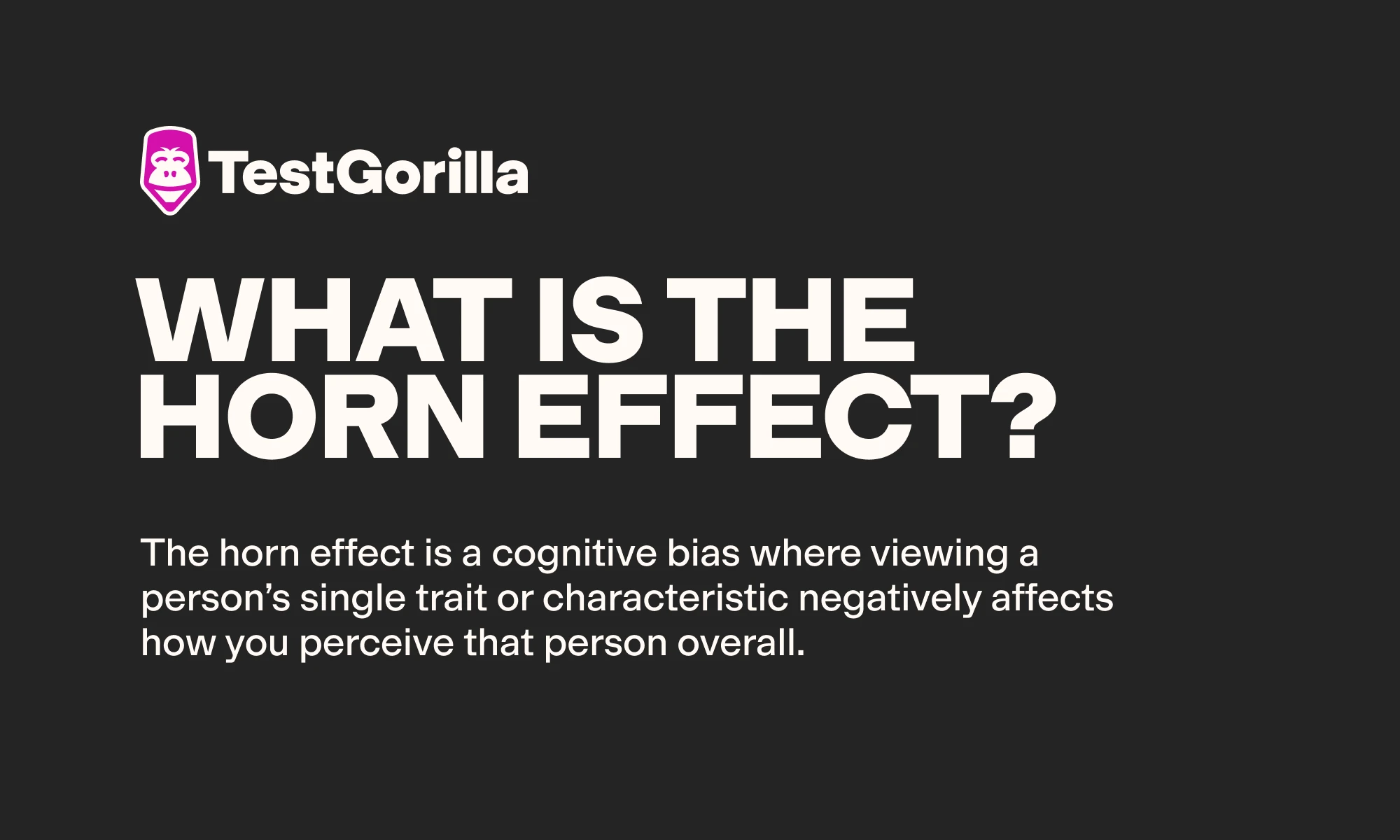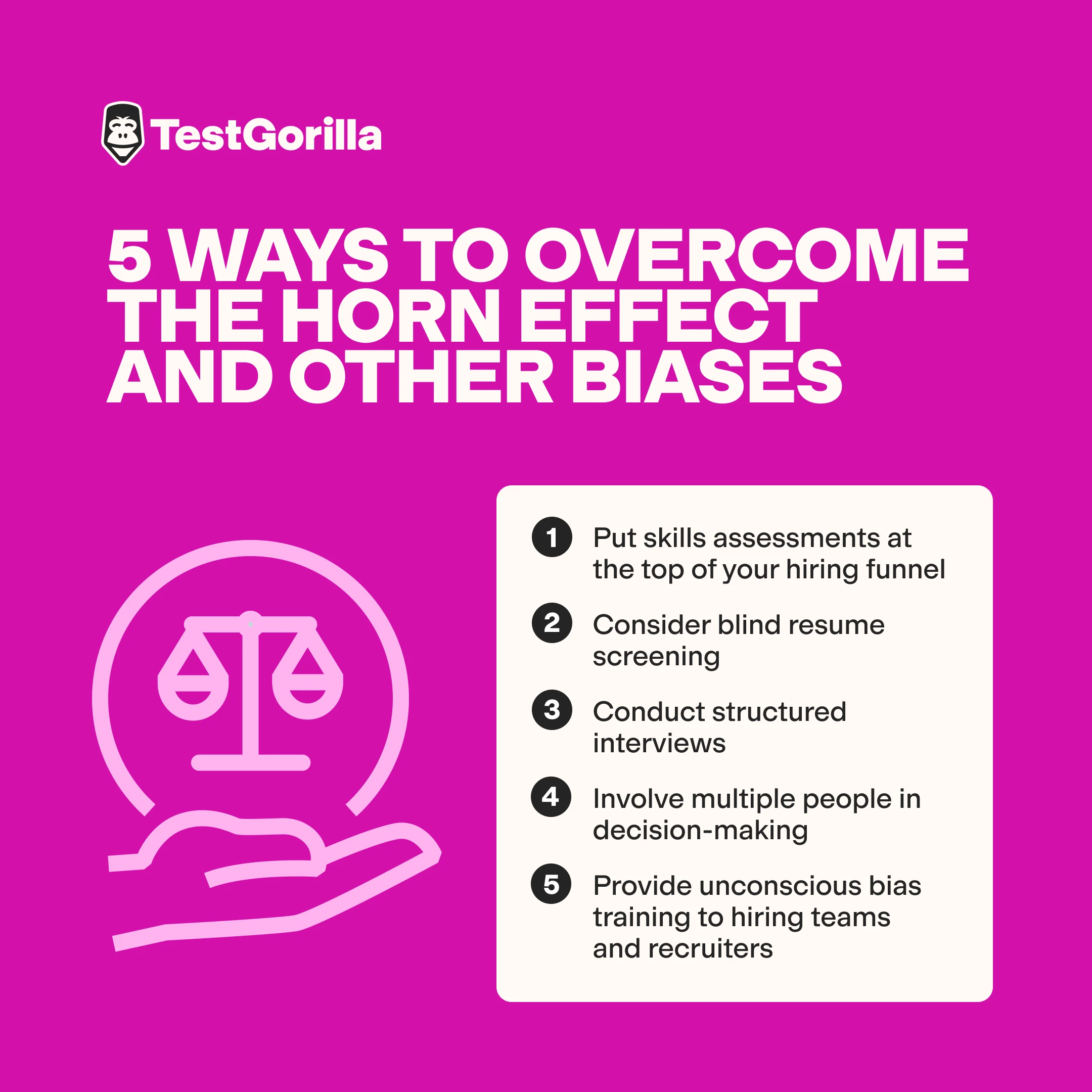Despite their best efforts, many employers hire the wrong candidates for their open positions, leading to confusion and frustration. One culprit? A cognitive bias called the “horn effect.“
So, how can you prevent this bias? With our help – that's how!
Below, we explain what the horn effect is and how it impacts your hiring process. We also share practical tips for curbing it and other hiring biases so you can attract and hire the best talent for your company.
Key takeaways
The horn effect is a cognitive bias where one perceived negative trait or characteristic in an individual influences your beliefs about their other qualities.
In hiring, this can manifest as a decision-maker denying candidates jobs or other growth opportunities simply because they don’t like a particular quality – and often, that quality isn’t even related to the job!
Letting this bias creep into company decisions can lead to mis-hiring, a bad employer brand, low engagement and retention, and even lacking diversity.
Skills testing is the best way to combat the horn effect and other biases, while structured interviews and unconscious bias training help, too.
What is the horn effect in the workplace?
The horn effect is a cognitive bias where viewing a person’s single trait or characteristic negatively affects how you perceive that person overall. This could mean that your dislike or disapproval of one quality in a candidate or employee can cloud your judgment of their other qualities and make you think more negatively about them and their abilities.
What is an example of the horn effect bias?
In the workplace, the horn effect could manifest as a recruiter or hiring manager focusing too much on one thing they didn't like about a candidate. For example, a recruiter might look at someone's college education and think, "This candidate didn't go to an Ivy League college – they're probably not good enough."
This negative impression could overshadow the candidate's real-world skills and abilities, leading to an unfair assessment and decision..
The best insights on HR and recruitment, delivered to your inbox.
Biweekly updates. No spam. Unsubscribe any time.
How does the horn effect damage your company?
The horn effect can have several negative impacts on your business.
1. Mis-hiring or mis-promotion
If a hiring manager overemphasizes one negative trait like a candidate’s appearance – especially when it has nothing to do with the job – they could overlook all the candidate’s skills and other job-relevant qualities. This could lead to them not only rejecting a perfectly suitable candidate for the role but also hiring the wrong person, which wastes time and money.
Similarly, when making a promotion decision, a manager or company leader might obsess over something irrelevant – such as disappointment in an employee's preferred sports team. Again, this may lead them to overlook the person’s long-term achievements and potential and give the job to someone less qualified. This can harm productivity, customer perception, and other business outcomes.
2. Poor employer brand
Candidates who feel unfairly judged or experience bias in the hiring process are unlikely to apply to your company again. What’s worse – they could share their negative experience with others through online platforms like Glassdoor and Linkedin.
This kind of reputational damage can stick – leading to fewer talented applicants applying for your open positions and affecting how you’re perceived by existing employees, customers, and investors. In fact, research shows that more than 50% of applicants won't apply to an organization after reading negative reviews about it.
3. Low engagement and retention
The horn effect can also lead to deserving employees being passed over for pay raises or other growth opportunities within the company. These decisions can make employees feel underappreciated and unfairly treated. The possible consequences? Reduced engagement, slowed productivity, and employees leaving your company.
When good talent leaves, it messes up your business operations – plus, you must pay to replace them. And what happens when employees see this happen to their colleagues? The answer: lower morale across the board.
4. Lack of diversity and inclusion
One way the horn effect happens is when decision-makers reject candidates or employees from backgrounds, interests, or perspectives that are different from their own. For instance, a recruiter might not give an applicant the opportunity to interview because they support a different political group or religion. Instead, the decision-makers might hire applicants with similar backgrounds, interests, or perspectives.
This can really impact diversity and inclusion in your company – stifling innovation, affecting business performance, and putting you on the back foot compared with competitors. In fact, McKinsey’s recent report shows that companies that prioritize diversity outperform those that don’t.
5 ways to overcome the horn effect and other biases
Here’s how to curb the horn effect and other unconscious biases.
1. Put skills assessments at the top of your hiring funnel
The best way to eliminate biases? Use skills assessments as the first step of your hiring process. By putting candidates through online talent assessments, you can assess their skills and other qualities before you meet them or scan their resumes or other application materials – as both these hiring processes are bias-prone.
When candidates perform well on their skills tests, denying them an opportunity because of some quote-unquote “negative” trait is harder – especially because you see the hard facts. This might also help you recognize how the horn bias affects your perception so you can check yourself going forward.
Our latest skills-based hiring report shows that 84% of employees believe skills-based hiring methods reduce unconscious biases in the recruitment process.
Pro tip: Take things to the next level by using a multi-measure testing approach. This means assessing candidates not just on hard and soft skills but also on their cognitive abilities, situational judgment, personality traits, and more. This gives you a complete picture of an individual's strengths and abilities in one go – making it harder for you to overly focus on one negative quality.
2. Consider blind resume screening
While resume screening is highly prone to biases, many employers continue to use resumes at the screening stage. We recommend ditching resume-screening, but if you feel it’s important to your hiring practices, try adopting blind resume screening to reduce unconscious bias.
In this process, employers use third-party companies or AI tools to remove candidates' names, photos, addresses, educational backgrounds, and any other personal or identifying information from their resumes before they're screened. Alternatively, they provide candidates with a ready resume template to complete that leaves no room for identifying information.
This can cut any horn-effect-prone info right at the source so applicants can be judged fairly.
3. Conduct structured interviews
Unstructured interviews that "go with the flow" are very likely to go off-topic and reveal information that’s prone to the horn effect.
For example, in an unstructured discussion, a recruiter might ask candidates irrelevant questions about their personal relationships, family, and more. If the interviewer has different beliefs or family values than a candidate, that candidate’s responses could cloud the interviewer’s judgment and lead to an unfair candidate dismissal.
That's why it's always better to use structured interviews. In this format, interviews ask candidates a fixed set of questions relating to the core competencies of the job – and nothing else. Each candidate is asked the same questions, and there are standard benchmarks to indicate a "good" answer.
In this way, structured interviews can guide the conversation toward assessing applicants' knowledge, behaviors, and experiences and reduce the chances of personal biases like the horn effect creeping in.
4. Involve multiple people in decision-making
A diverse panel of decision-makers can help reduce individual biases in recruitment and promotion decisions. Each person on the panel might notice different strengths and weaknesses, leading to a more balanced evaluation.
For example, if one decision-maker obsesses over a candidate being shy, another might highlight their strong technical skills. This approach results in a more holistic approach.
Pro tip: Implement a clear and objective scoring system for decision-makers – one that focuses on the skills, can be completed individually, and helps standardize the process. This eliminates the likelihood that one decision-maker's bias influences another's.
5. Provide unconscious bias training to hiring teams and recruiters
Put all your hiring managers and recruiters through regular unconscious bias training at least once every six months. For example, you might conduct a workshop focused on perspective-taking, where employees role-play and put themselves in others' shoes. You can also roll out an implicit association test to help them identify their own biases.
These sessions can raise awareness about cognitive biases in decision-making, offer strategies to overcome them, and even help them identify the biases they're personally prone to.
For instance, it might help a manager notice they overly focus on candidates' appearance – so they can check themselves when they're evaluating applicants.
Hire better and fairer with talent assessments
The horn effect can skew a decision-maker’s perceptions of a candidate or employee, leading to unfairly rejecting them for a role or growth opportunity. Worse yet, it can entice them to select a less skilled candidate instead.
The consequences? Disrupted business, damaged company reputation, and demoralized staff.
Skills-based assessments, such as TestGorilla's skills tests, are the best way to prevent the horn effect from influencing your selection process. Additionally, blind resume screening, structured interviews, collaborative decision-making, and unconscious bias training can improve objectivity during different stages of recruitment.
FAQs
Why is it called the horn effect?
The word "horn" comes from the devil's horns because they imply negative traits and qualities. It suggests that when we notice one negative thing about an individual, we let that "horn" overshadow everything else and make unfair judgments about them.
What is meant by the halo effect?
The halo effect occurs when a single positive quality of a person makes you see them in an overly favorable light. For instance, you might hire someone because you like how they look or where they attended college. It's the opposite of the horn effect.
You've scrolled this far
Why not try TestGorilla for free, and see what happens when you put skills first.
















